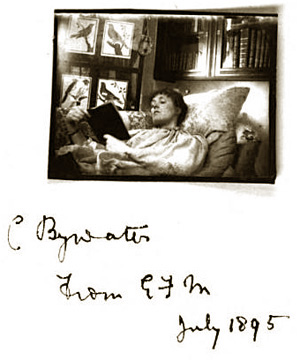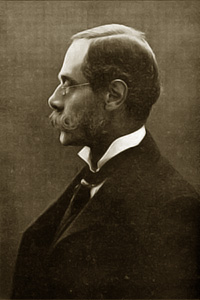Notes and Acknowledgements
 |
|
The text of The Etchingham Letters, is taken from a Google Books edition, an 1899 imprint. Ella Fuller Maitland’s Pages from the Day-book of Bethia Hardacre appeared four years earlier, in 1895. In an edition of Hardacre digitized by Google Books, Mateland has initialed a copy of the book to a C. Bywater. Above the inscription is a photograph—which we infer from the shadowed edge was pasted in—that we are supposing might be Maitland herself. At this writing, however, are still searching for biographical information on Maitland, though a reviewer in Country Life Illustrated (April 29, 1899) writes of The Etchingham Letters: “Mrs. Fuller Maitland treats her readers to some weirdly real descriptions of Scottish scenery, passages the more remarkable because they were written on an invalid’s sofa in London.”
Ella Fuller Maitland is also the author of a number of other books, including three from publisher Chapman and Hall, Pages from the Day-book of Bethia Hardacre (1895), The Saltonstall Gazette (1896), The Song-book of Bethia Hardacre (1897) and More Pages from the Day-book of Bethia Hardacre (Constable, 1907).
 |
 |
Sir Frederick Pollock, is known chiefly as an English jurist, an author of texts on English law, and a correspondent with US Supreme Court Justice Oliver Wendell Holmes.
He was also an Oxford law professor and the first editor of The Law Quarterly Review, found 1885.
Pollock’s books range from his translation into English of Dante's The Divine Comedy (Chapman and Hall 1854) to such texts as The Principle of Contract Law and in Equity (Steven and Sons, 1876), Essays in Jurisprudence and Ethics. (Macmillan and Company, 1882) and The Genius of the Common Law (Columbia University Press, 1912). ![]()